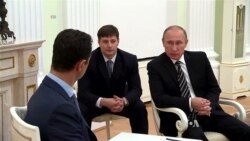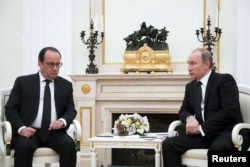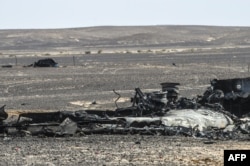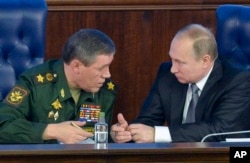Russia’s airstrikes in Syria thrust it to the center of global efforts to tackle terrorism, refugees and a peace deal with Damascus.
"In the beginning of the year, Russia had no say in world affairs, with exception of the point where it was completely necessary, absolutely necessary to resolve the crisis created with its participation,” said Alexander Baunov with the Carnegie Moscow Center. "By the end of the year, we see that Russia’s place in the world is pretty much different."
Russia says it began bombing terrorists in Syria in late September, but it is accused mainly of targeting moderate rebels opposed to its ally, Syrian President Bashar al-Assad.
Rights group allegations
The London-based Syrian Observatory for Human Rights says Russian airstrikes have killed hundreds of civilians and cut off humanitarian supplies.
Despite these concerns, and Western sanctions against Russia over its annexation of Crimea and ongoing military support for rebels in eastern Ukraine, U.S. Secretary of State John Kerry visited Russia this month, holding meetings with President Vladimir Putin and Foreign Minister Sergei Lavrov.
"There is absolutely no question,” said Kerry at a news conference afterward, “when the United States and Russia work together effectively, our two countries benefit and we think also so does the global community."
Projecting policy
The Kremlin’s help on Syria, even while its bombing continues, is seen in Moscow as a victory, ending much of its diplomatic isolation over its actions in Ukraine — though sanctions against Russia were extended by the European Union.
“There is the general feeling here, I would say, among the political and military elites, that Russia now has the competitive edge over the West, that it is imposing its agenda,” said Victor Mizin, a political scientist with the Moscow State Institute of International Relations.
French President Francois Hollande traveled to Moscow last month and pledged anti-terrorism cooperation and some coordination of airstrikes in Syria.
“There are some signals that, not just European partners, but even in United States, there are certain understanding that, yes, probably Russia is not as friendly as we would dream about,” said Mizin. “But we have to negotiate with that.”
Lavrov said he and and Kerry made progress toward agreeing on a list of terrorist groups in Syria, as well as forming a representative opposition delegation to hold talks with Assad’s government.
A U.S.-led alliance has stepped back from calls for Assad to leave power. Moscow has opposed such calls, saying the Syrian people should decide.
Kerry said the United States and its partners are not seeking so-called “regime change" in Syria.
"What we have said is that we don’t believe that Assad himself has the ability to be able to lead the future Syria," he said. "But we do believe that nobody should be forced to choose between a dictator and being plagued by terrorists. Our challenge remains creating the conditions on which an alternative can emerge.”
Success with a price
Putin’s military reach into Syria has come at a cost. Islamic State (IS) terrorists claimed responsibility for the bombing of a planeload of Russian tourists in October over Egypt’s Sinai.
Moscow's military campaign in Syria "has increased danger of terrorist attacks against Russians everywhere in the world and inside Russia itself,” said the Carnegie Moscow Center’s Baunov.
Russian authorities say thousands of its citizens are fighting with IS and may return home to launch terrorist attacks.
Warplane downed
Turkey’s downing of a Russian warplane along its border with Syria in late November dropped relations to a low and underscored the risks of a wider conflict.
Turkey is a member of the NATO, and Russian claims the Western military alliance is threateningly expanding and encircling it — a claim NATO denies.
Russia retaliated for the loss of its plane by severing military communications with Turkey, suspending large projects, enacting sanctions against Turkish products and suspending a visa-free travel regime.
While Russia's projection of power plays well domestically, life at home is getting harder under a shrinking economy expected to contract about 4 percent this year and continue contracting in 2016, despite some official denials.
"It is not destroyed or torn apart, but it is very weak. Stagnating, not developing. Lacking technology and lacking money,” Baunov said.
A continued decline would eventually drop support for Putin, though his ratings remain at a record high, Baunov said.
Analysts say the popularity ratings are inflated by nationalist sentiment over what are considered inside Russia to be big political achievements, including last year's Winter Olympics in Sochi and annexation of Crimea, and the ongoing projection of power in Ukraine and Syria.
Mark Grinberg (pseudonym) contributed to this report.









